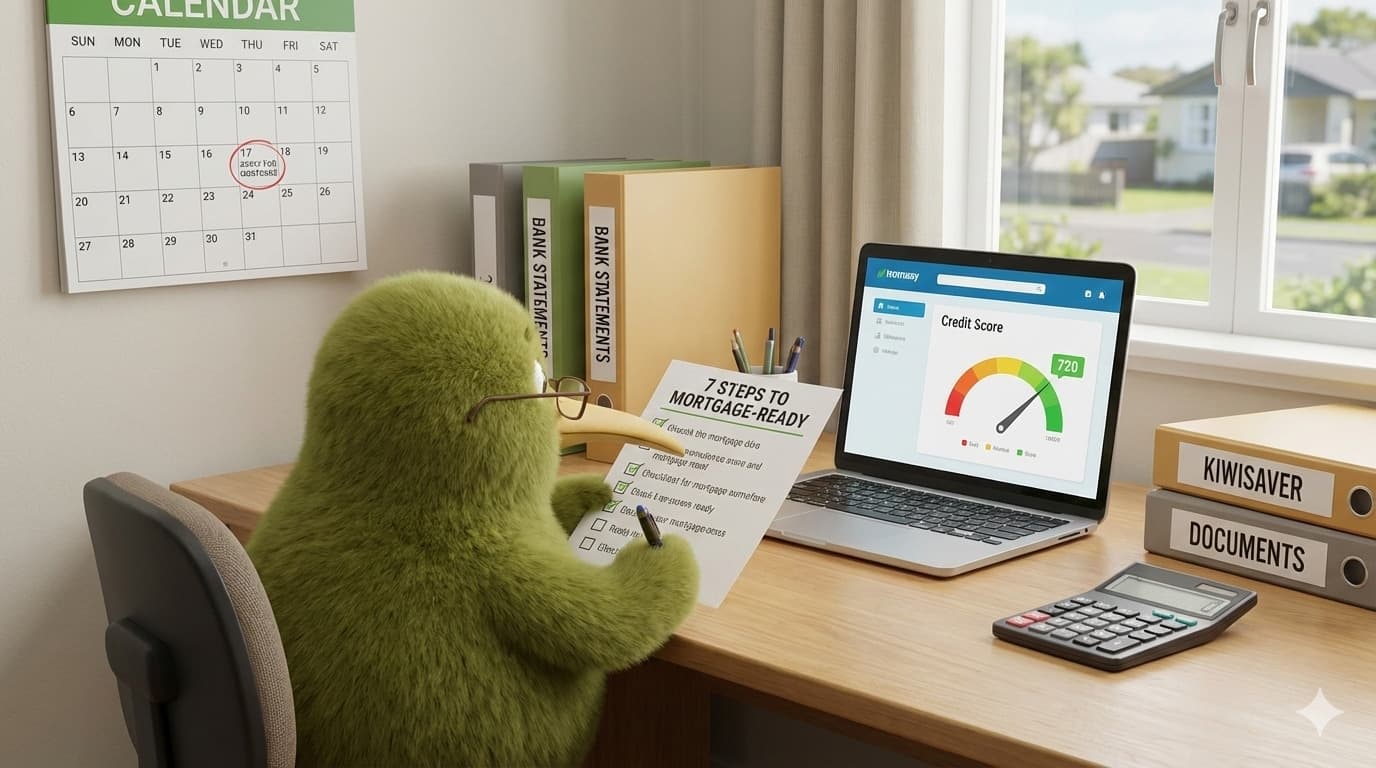Disclaimer:
The information on this website is for general guidance only and does not constitute financial or investment advice. Always do your own research and seek personalised advice from a qualified financial adviser or mortgage adviser before making financial decisions. All investments carry risk and past performance is not indicative of future results.
Key Takeaways
- Clean bank accounts show consistent income and disciplined spending.
- Stable employment evidence is critical for lender confidence.
- Prepare complete documents to avoid approval delays.
- Check your credit file and fix issues early.
- Reduce debt and confirm affordability before applying.
Saving a deposit is a major achievement, but it's only the beginning. If you're applying for a mortgage, lenders want to see more than just a bank balance. They want confidence in your ability to repay the loan and manage your finances.
Here are 7 critical steps to prepare yourself for a successful mortgage application.
1. Clean Up Your Bank Accounts
Lenders will request the last three months of your bank statements to review how you manage your day-to-day finances. They want to see evidence that you're living within your means, paying your bills on time, and not relying on credit to make ends meet.
To strengthen your application, make sure your income is being deposited regularly and is clearly labelled. You should aim to have a consistent surplus left at the end of each month after expenses, as this demonstrates you can manage ongoing mortgage repayments. Consider cancelling or reducing any unneeded subscriptions or discretionary spending in the months leading up to your application.
It's important to avoid unarranged overdrafts or dishonoured payments, as these are red flags for lenders. Banks will cross-reference your declared income and expenses with your actual account activity, so ensure your statements match what you'll state in your loan application. The goal is to show the bank you're a low-risk, financially responsible borrower.
Learn More: The Importance Of Looking After Your Bank Account
2. Confirm Your Employment Status
Stable employment is one of the key factors that banks consider. They need to be confident that your income will continue in the foreseeable future.
To support your application, provide a signed letter from your employer confirming your employment type (whether permanent, full-time, part-time, or fixed-term) and your current income. Include your last three payslips to verify consistency of earnings. If you've received bonuses or commissions in the past two years, provide documentation, though be aware that many banks no longer count future bonuses in their calculations due to economic uncertainty.
Self-employed applicants should submit their two most recent year-end financial statements. Some banks may accept just one year if your business is demonstrably stable and profitable. Contractors and sole traders should also include their IRD tax summaries. Banks take into account the industry you're in, so if your job is in a sector seen as volatile or seasonal, you may need to provide additional proof of income reliability.
3. Gather All Required Documents
A strong mortgage application is built on complete, well-organised paperwork. Missing documents can cause unnecessary delays or even result in declined applications.
You'll need three months of bank statements for all accounts, including savings, everyday, and any joint accounts. Gather your three most recent payslips, or two years of financial accounts if you're self-employed. Valid photo ID is required, typically a passport or a combination of birth certificate and driver's licence.
Prepare your KiwiSaver statements showing your current balance, along with bank savings account statements as proof of your deposit. If you're receiving funds from family, you'll need a gift declaration confirming that the money is a gift rather than a repayable loan. If you've already found a specific property, include the property information pack, listing details, or Sale and Purchase Agreement.
The more thorough and transparent you are with your documents, the smoother the approval process.
Need personalised guidance?
Chat with a First Home Buyers Club affiliated mortgage adviser - no obligation!
4. Speak to a Mortgage Adviser
Mortgage advisers act as a bridge between you and the banks. They understand the different policies and lending criteria of various lenders, and they can match your application to the bank most likely to approve it.
Engaging with an adviser early in your journey can help you assess how much you can borrow based on your income, expenses, and deposit. They can explain the difference between fixed, floating, or split loan structures and help you navigate special loan options like low-deposit First Home Loans. Advisers also provide valuable support when preparing documents and completing applications.
One of the biggest advantages of using a mortgage adviser is that they can save you time by steering you towards lenders most likely to approve your application, helping you avoid unnecessary declines on your credit file. Mortgage advisers are usually paid by the lender rather than by you, so there's no cost to using their service in most cases.
5. Prepare Your KiwiSaver Withdrawal
If you're relying on your KiwiSaver balance to boost your deposit, you'll need to begin the process early to avoid delays.
KiwiSaver Withdrawal
- Contact your KiwiSaver provider early to understand their processing times and what documents they require
- You can withdraw your entire balance minus $1,000 which must remain in your account
- If you're within 6–12 months of buying, consider moving your KiwiSaver funds to a Conservative Fund to protect your deposit from short-term market fluctuations
Getting your KiwiSaver withdrawal sorted early helps ensure your deposit is ready when you need it.
6. Run a Credit Check
Lenders use your credit report to assess whether you're a trustworthy borrower. Any unpaid defaults or past issues can negatively impact your application - even if they've since been resolved.
Check your credit file before applying so you can identify any outstanding debts or defaults that might affect your application. This gives you time to resolve any errors on your report before the bank sees them. If there are negative marks on your file, you may be able to add explanations for circumstances like redundancy or illness that led to past difficulties.
You can request a free credit report from providers like Centrix, Illion, or Equifax. Allow a few days for processing, so factor this into your timeline.
A clean credit file with minimal consumer debt is a strong signal to lenders that you're ready for a mortgage.
Learn More: The Impact of Credit Scores on Mortgage Approval
7. Get Rid of As Much Personal Debt As Possible
One of the most impactful things you can do to improve your mortgage readiness is to reduce or eliminate personal debt before applying for a home loan.
When a bank assesses your application, they look closely at your ongoing financial commitments, not just your income and deposit. This includes credit cards, personal loans, car loans, buy now pay later balances, overdrafts, and even unused credit limits. All of these reduce the amount of income the bank believes you have available to service a mortgage.
What often surprises first home buyers is just how big the impact can be. As a rough guide, every $10,000 of personal debt can reduce your home loan affordability by approximately $50,000. This is because lenders stress-test your repayments and assume those debts will continue alongside your mortgage.
For example, carrying $20,000 of personal debt could mean the difference between being approved for a $700,000 home loan versus $600,000 — which can materially affect the type of property or location you can realistically buy in.
To Improve Your Borrowing Position:
- Pay off high-interest debts such as credit cards as a priority
- Reduce or close unused credit limits, even if they have a zero balance
- Avoid taking on new debt in the months leading up to applying for a mortgage
Clearing personal debt not only improves your chances of approval, it can significantly increase how much you can borrow and leave you in a much stronger position when repayments begin.
Frequently Asked Questions
Track Your Progress
Sign up free to use the Pre-Approval Documents Checklist and track your home buying journey.
Create Free AccountAlready have an account? Sign in
Related Articles

A First Home Buyer's Guide to Real Estate Terms and Sale Methods in New Zealand
Essential guide to understanding real estate terms, sale methods, and property jargon for first-home buyers in New Zealand. Learn about auctions, deadline sales, and more.

Buying a Monolithic or Plaster Home in New Zealand: What First Home Buyers Should Know
Essential guide for first-home buyers considering monolithic or plaster homes in New Zealand. Learn about weathertightness, inspections, insurance, and legal protections.

How to Secure a New Build with a 5% Deposit
Learn how first-home buyers can secure a new build in Auckland with just 5% deposit using the First Home Loan scheme and KiwiSaver.

How to Supercharge Your First Home Deposit in New Zealand
Learn proven strategies to accelerate your savings and reach your deposit goal faster with KiwiSaver and smart saving techniques.

